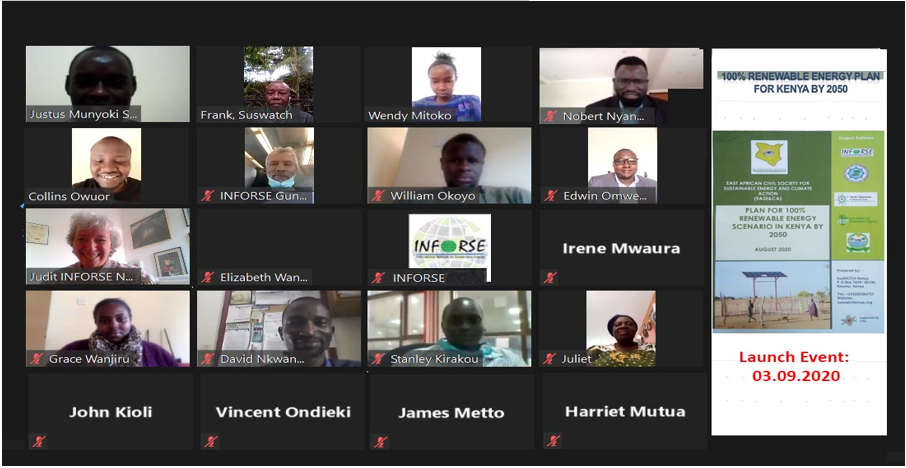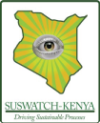
Project Officer – Decentralisation and Climate Change in the Lake Victoria Basin Program (DACCA)
The Project Officer will be a key member of the Advocacy Working Group
within the DACCA Program. The role primarily focuses on facilitating engagement with county
governments, coordinating community initiatives, implementing advocacy campaigns, and
ensuring social accountability measures are effectively integrated into program activities.
SusWatch Kenya Officially Launches 100% Renewable Energy Scenario in Kenya by 2050

On Thursday September 3, 2020 SusWatch Kenya launched a report on 100% Renewable Energy (RE) scenario in Kenya by 2050.
As part of our activities in the EASE&CA project; 100% renewable energy scenario for Kenya by 2050 was developed in collaboration with both national and County governments, academia, private sector, non-state actors and other partners in order to participate fully in the processes, as well as influence the implementation of SDG 7.
The Launch event which was presided over by the Ministry of energy took place virtually via zoom incorporated twenty stakeholders which comprised of the Ministry of energy, National Civil Society organizations, GIZ, WWF our National Partners, EASE&CA partners (INFORSE &UCSD) and SusWatch Officials.
The SusWatch National coordinator, Mr Nobert Nyandire expressed the pleasure of welcoming all participants to the launch and thereafter the EASE&CA project coordinator Mr Justus Munyoki briefed the participants about the EASE&CA project including the EASE&CA project objectives, activities, and summary of 100% renewable energy scenario for Kenya by 2050.
The Principal Renewable Energy Officer, Renewable Energy Directorate, Ministry of Energy Mr Edwin Omwenga; provided a comprehensive presentation on Supporting Renewable energy Development. Mr Edwin Omwenga conveyed the launch statement and delightfully pronounced the 100% RE scenario for Kenya by 2050 officially launched. “ An important aspect of this project feeds in to the national energy priorities including Nationally Determined Contributions (NDCs) and Long-term low Emission Development Strategies (LEDS) to the Paris Agreement, as well as national activities to implement SDG7 (clean energy), including the Sustainable Energy for All strategies . Meaningful participation by civil society organizations (CSOs) in the energy sector is widely recognized as being essential and beneficial to the process; they can act as trusted intermediaries between government, the private sector, and energy users on the ground, as well as having expertise in designing and delivering energy services, particularly for poor and vulnerable groups” said Mr Omwenga.
The 100% RE report gives an overview of the Kenyan situation regarding energy supply and demand, and presents a scenario for how Kenya can move into a 100% renewable energy economy until 2050 and at the same time move from a lower middle income country into an upper middle income country as well as reduce biomass use for energy to sustainable levels.
The report also gives an overview of the Kenyan situation regarding energy supply and demand, and presents a scenario for how Kenya can move into a 100% renewable energy economy until 2050 and at the same time move from a lower middle income country into an upper middle income country as well as reduce biomass use for energy to sustainable levels.
The report explains specific proposals that lead to 100% renewable energy development. The results include strongly increased electricity production from renewables, the change of the total primary energy demand to 100% renewables, reduction of biomass use to be within sustainable levels of biomass production in Kenya, reduced emissions of CO2, and estimates of costs of energy supply in the scenarios in 2030 and 2050.
When all was said and done, the EASE&CA project assistant Miss Wendy Mitoko gave a way forward which was basically the promotion of the strategies of and scenario of the 100% RE plan for Kenya. The report is available on social media platforms including press release, Facebook (https://www.facebook.com/www.suswatchkenya.org), twitter (@Suswatch_Kenya), whatsApp groups, SusWatch website; https://www.suswatchkenya.org/wp-content/uploads/2020/09/100-Renewable-Energy-Plan-for-Kenya-by-2050-12-08-2020.pdf.
There will be publications of the report which will be shared with the relevant stakeholders. The report will be highlighted on the newsletters; East Africa SusWatch E-bulletin and published on Sustainable energy News from INFORSE which again will be shared with stakeholders and available on social media platforms.
Kisumu County Integrated Development Plan ll

When your contribution gets acknowledged, you feel proud of your service to the community. We are happy to have played an active role in the preparation and launch of the 2018-2022 Kisumu County Integrated Development Plan (CIDP II). Not forgetting the contribution of our partners and friends, Friedrich Ebert Stiftung-Kenya Office (FES- Kenya) and Kenya Water and Sanitation Civil Societies Network (KEWASNET). Onwards and upwards !


Thailand is certainly taking matters 🌎 warming seriously. The news is awash with countries acting on deforestation 🌲🌳🌴and East Africa will not be left behind. Who’s taking the baton from Ethiopia?
https://www.the-open-mind.com/thailands-military-bombs-th…/…

In collaboration with our partners, Friedrich Ebert Stiftung (FES) , Kisumu County Government- Directorate of Climate Change and CREP programme, a workshop on linking climate response to SDGs was organised with a special focus on SDG 5, 8, 10, 13 for the Kisumu County Climate Change Working Group

How to shape a socially just development paradigm that integrates climate justice actions. Together with our partners
@feskenya @KisumuCountyKE
today we are holding a workshop on climate change mainstreaming into development planning; progress, challenges, lessons learnt.
